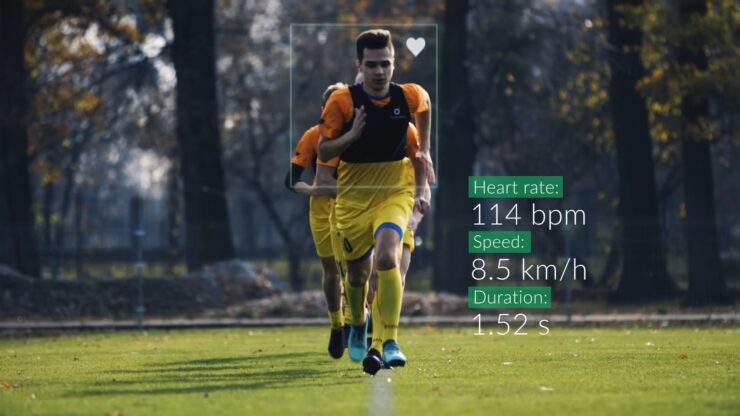The beautiful game of football, known for its thrilling matches and passionate fans, has been a global favorite for generations. Over the years, advancements in technology have transformed various aspects of the sport, from stadium design to player training. One such innovation that has gained immense popularity in recent years is the use of GPS trackers in football. These small devices, typically worn by players, are revolutionizing the way coaches, managers, and athletes approach the game. In this article, we’ll delve into the world of GPS tracking in football, exploring its purpose, benefits, and impact on the sport.
GPS Trackers in Football Explained
A GPS tracker is a small device that uses Global Positioning System technology to determine its precise location, speed, and other movement-related data. In football, players wear these trackers during training sessions and matches, enabling coaches and team staff to monitor their performance in real time.
The data collected by GPS trackers is then used to analyze various aspects of a player’s game, such as distance covered, positioning, and fatigue levels. This detailed analysis helps in creating personalized training programs, preventing injuries, and enhancing the overall performance of the team.
The data collected by these trackers is also beneficial for tactical analysis. By understanding the patterns of player movement and positioning, coaches can make more informed decisions and develop game strategies that exploit the strengths and weaknesses of their team and opponents.
Key Features of GPS Trackers in Football
![]()
GPS trackers in football come with several features that make them invaluable tools for performance analysis and improvement. Some of the essential features include:
1. Real-time player monitoring
GPS trackers provide live data on each player’s location, speed, and movement patterns, allowing coaches to make on-the-spot adjustments during training sessions and matches.
2. Detailed performance metrics
These devices collect a wide range of data points, such as total distance covered, high-intensity sprints, accelerations and decelerations, and time spent in different speed zones. This information is crucial for understanding the physical demands of the game and tailoring training programs to meet individual player needs.
3. Heat maps and player positioning
By analyzing the data collected from GPS trackers, coaches can generate heat maps that display the areas of the pitch where players spend the most time. This information is crucial for tactical planning, as it helps identify potential strengths and weaknesses in the team’s formation and playing style.
4. Injury prevention and player well-being
By monitoring the workload and fatigue levels of players, GPS trackers can help prevent injuries caused by overtraining or fatigue. This is particularly important in today’s high-paced game, where the physical demands on players are greater than ever before.
Benefits of These Trackers in Football
The use of GPS trackers in football offers numerous benefits for players, coaches, and clubs. Some of the key advantages include:
1. Enhanced performance analysis
The detailed data provided by GPS trackers allow coaches and analysts to evaluate player performance at a granular level. This information can help identify areas of improvement and design personalized training programs that target specific weaknesses.
2. Improved player fitness and conditioning
GPS trackers enable coaches to monitor the physical demands placed on players during training and matches. This information is vital for developing conditioning programs that improve stamina, strength, and agility while minimizing the risk of injury.
3. Tactical insights

By analyzing player movement and positioning data, coaches can gain valuable insights into the team’s playing style and tactics. This information can be used to adjust strategies and exploit weaknesses in the opposition’s formation.
4. Injury prevention
GPS trackers help identify players at risk of injury due to excessive workload or fatigue. By managing training loads and recovery times effectively, clubs can reduce the incidence of injuries and maintain a healthier, more productive squad.
5. Player development
The use of GPS trackers allows coaches to track the progress of individual players over time, making it easier to assess their development and potential for growth. This information can be particularly valuable for youth academies, where nurturing and evaluating talent is crucial for success.
6. Recruitment and scouting
The data collected by GPS trackers can be useful for clubs looking to recruit new players or assess the performance of their current squad. By comparing the data of potential recruits to that of their existing players, clubs can make more informed decisions and improve the overall quality of their teams.
When discussing the power of data in football, it’s important to explore advanced technologies like Bia sensors and understand how they work, such as on the Galaxy Watch 4
Real-Life Examples of GPS Trackers in Football

Many professional football clubs worldwide have embraced the use of GPS trackers, with numerous success stories demonstrating their impact on the game. Here are a few notable examples:
Liverpool FC
Under the guidance of manager Jürgen Klopp, Liverpool FC has become one of the most successful clubs in Europe, with their Premier League title win in 2019-2020 being a testament to their prowess. A crucial component of their success has been the implementation of GPS technology, which has helped the coaching staff optimize player performance and reduce injury rates.
FC Barcelona
The renowned Spanish club, FC Barcelona, has long been at the forefront of sports science and technology. The use of GPS trackers has played a significant role in the club’s continued success, providing invaluable insights into player performance and helping shape their iconic playing style.
Leicester City FC
In one of the most remarkable underdog stories in football history, Leicester City FC defied the odds to win the Premier League title in 2015-2016. Their success has been attributed, in part, to the club’s innovative use of GPS tracking technology, which enabled the coaching staff to tailor training programs and manage player workloads effectively.
Challenges and Future Prospects
![]()
Despite the numerous benefits of GPS trackers in football, there are certain challenges associated with their use. One such challenge is the potential for data overload, as the sheer volume of information generated by these devices can be overwhelming for coaches and analysts. To address this issue, it is essential for clubs to develop efficient data management systems and invest in the training of staff to analyze and interpret this data effectively.
Another concern is the privacy of players, as the continuous monitoring of their movements could be seen as intrusive. To address this issue, clubs must strike a balance between utilizing the technology for performance enhancement and respecting the privacy of their players.
Looking ahead, the future of GPS tracking in football seems promising. As technology continues to advance, we can expect more accurate and sophisticated devices that provide even deeper insights into player performance. Furthermore, the integration of GPS data with other performance analytics tools, such as video analysis and wearable sensors, will likely lead to a more holistic understanding of the game and its demands on players.
Final Words
The use of GPS trackers in football has revolutionized the way coaches, players, and clubs approach the game. By providing detailed insights into player performance, movement, and positioning, these devices have become indispensable tools for enhancing performance, preventing injuries, and gaining a competitive edge. As technology continues to evolve, the role of GPS tracking in football is set to become even more significant, shaping the future of the sport in exciting and innovative ways.
